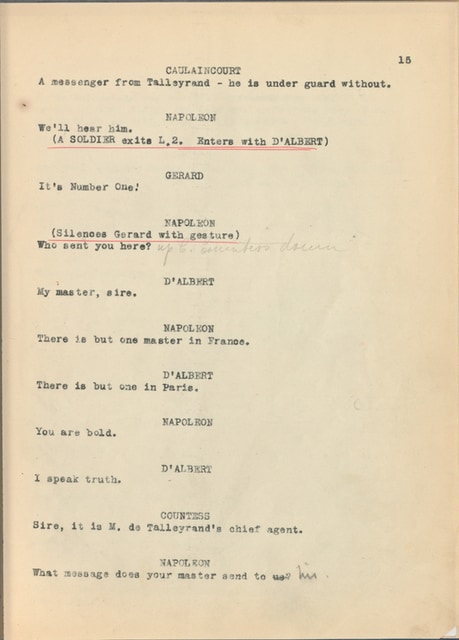
Auditioning for screen requires actors be fully prepared and emotionally present while being filmed by a casting director. Auditioning for the stage requires actors to deliver a strong vocal performance with a heightened physicality where a director, producer and or stage-manager is often present.
Acting for the screen is quite different from acting for the theatre or stage. They are two distinct genres in which an actor can be employed to act, dance or perform.
The Stage Audition Process
When auditioning for the stage, depending on the company, the size of the cast, and the style of theatre, a performer or actor may be required to prepare a script set out in an audition notice. They also may be asked to come prepared with at least one monologue (on a chosen genre) and also be prepared for cold reading as a two-hander.
Sometimes they will be required to come with two contrasting monologues, usually a dramatic and a comedy.
Actors or performers may be asked to audition alongside a large group of people, especially if auditioning for a dance show or musical theatre show. This is usually for the production team to decide quickly who they feel is best suited to their show, rather than having them audition one by one.
Auditioning in a group also gives the production team a good view of the physicality and personality style a performer has with others.
If auditioning for a large production such as a musical, typically an actor would enter a large room filled people other actors wanting roles. There may be a table with assistants who will take personal details and they will give time and or number to take with them into the audition room.
Numbers are often pinned to a performers clothing. But not all production companies follow this practice.
The large room is called the ‘holding room.’ Most other people are sitting waiting for their turn to audition. Some will be immersed in their notes, music, and or script. This is often a nervous time for actors as this is where they size up the competition. Actors often meet other actors they’ve worked with before, so there is often a fellow recognition.
The audition casting advertisement usually includes the following information:
Production Company
Producer, Director
Musical/Play/Production Name
Short Sypnopsis
Characters ages/ethnicities/gender etc
Dancers, musicans, singers and or actors
Auditon times:
Contact Information:
Depending on the production ,they may ask performers to prepare a song and or script appropriate to the role they wish to audition for. Often they will give guidance as to what kinds of songs they want those who are auditioning to sing.
Show: WestSide Story (Musical Theater)
Maria: 17-22 years old
Innocent, strong and bold
Needs a pure soprano voice and be prepared to sing a song appropriate to her
Character. Please bring your musical score.
Needs to be able to be a strong lyrical, contemporary dancer. Bring appropriate clothing.
If auditioning for a particular singing role, people sometimes want to dress as the character would likely look on stage. This will give the director an indication as to what they would look like in that role and it will allow the director to know how serious they are for the role.
When entering the auditon room, there is usually the director, producer or stage managers including a person who may be filming. They will be seated on a table with the actors resume and waiting for the actor to be introduced to them.
Auditioning with Music

Some directors will introduce themselves and ask an actor/performer to stand on a spot ready to sing their chosen song. The actor hands their musical arrangement to the pianist in the room, ready for their singing. It is at this point that an actor can advise whether the musician can play a slower or faster tempo or to give any other instructions.
TiP:
- Try not to hand over an overly difficult musical score, as the musician may not know your musical score and may find it difficult to play (It depends on the talent of the pianist as well).
- Do not be too picky or demanding with the musician. You will come across as a diva or ‘difficult’.
- Bring music appropriate for your voice. If you are an alto singer, do not bring in a soprano styled musical score.
- Communicate to the musician if you would like a particular tempo and or key etc.
If you are wanting excellent screen acting books, my post on the best screen acting books are best for you to take a look at and purchase through amazon. I have read most of the following books which are great reads to develop skills in acting for the theater and or on stage.
Often during the singing part of the audition, they will stop the singer halfway or even less into the song. This is usual and it is not indicated if they like or dislike a person’s audition.
From the directors or musical director’s point of view, it is very easy to see if a person is able to sing a role within the first few lines of singing. They are moving on probably because they have others to audition.
Sometimes with acting auditions, actors will be handed a script either cold or asked to produce their warm script ready to act. Often there is another actor who will either stand-in for the ‘actual’ actor or they will be a stand-in reader.
Cold script verses Warm script in Auditions

A cold script is where actors are handed a script without having had the chance to read it or work on it on their own. A warm script is one where they are handed the script and given some time to work on it, before having their audition.
Sometimes a warm script can include a person being able to work on the script for a number of days or some time during the audition they are attending, which is different from cold reading.
To get an idea of a script for a scene check out my post here. Or to rehearse with a friend for a two hander script, click here for the link.
Dance for the Audition
If dancing is utilized in the production, actors may be shown a short dance to showcase to their panel. Sometimes this will be done as a large group. Often after your first audition, you will be asked to stay around to have the dance audition.
After this audition is over, actors leave the audition space and get on with their day.
Call Backs to Audition Again
If actors are deemed suited to a role, the producer or casting director may want to have the actor back to act, sing or perform in again to see if they are truly the right candidate for the role. Often the Actors agents/managers send information to the performer to let them know the details.
A second audition or call-back is usually enough to see if a person is right for a role. However, if there are a number of people called back, it means that there are a number of roles to be filled, or that this is one call back among many callbacks in the future.
This book from Amazon is excellent for landing the perfect part. It is of course by a famous actress who has passed along her skills.
Landing the Role from an Audition
Depending on an actor’s status as a professional or community theatre, they are usually told by the production team if they ‘got’ a role or not. Sometimes the agent is informed and sometimes not. More often than not, performers aren’t told if they made it into the production. (Don’t call us, we’ll call you!)
Tips and Tricks while Auditioning
Tips and Tricks:

- Be pleasant to everyone because you never know if that stage-hand will be your next director or they could be related to the producer.
- Read audition notices closely and remember to bring in your correct clothes, music, script, resume (if in the States)
- Have your lines learned off by heart, there is nothing worse than having actors fumble around for words and not truly being in the moment with the scene at hand.
- Enjoy the process and don’t see the casting director as your enemy. They want you to be the perfect choice for the role just like you.
- Be on time or at least 15 minutes early. Not too early or too late.
- If it is expected to bring in your acting resume, then bring it in along with extra photo sides of yourself. (photos)
- Don’t complain about your day or be overly friendly.
- Don’t complain about former companies, directors or actors, just go in and do what is asked.
- Try not to be too clever. You many think that using an over the top vibrato in your soprano voice will impress, but too much and you’ll be seen as a Diva.
Remind yourself that if you don’t get this role, another will be suited for you.
Acting for Screen Audition Process

Opportunities for screen includes acting for film, television programs, presenting shows, acting for commercials or any job in front or behind the screen. Often actors become crew if they get the opportunity and sometimes it’s a better fit.
Usually an actor is alerted to an audition by their actor’s agent. Depending on the country or city, this person could also be a manager.
A script or ‘Side’ is usually sent via email from the actor’s agent to the casting director’s office. This alongside with a brief page summary of your Acting Resume or Curriculum Vitae.
Also the actor to read and learn before the audition. Actors usually work on characterisation, memorization techniques previous to going into the audition.
Again depending on the practices of the casting director, an actors resume may already be sent in by your agent or manager. However some casting directors do require, actors to produce sides or clear headshots of themselves with their names, date of birth and actors agent.
The Date of the Audition
On the day of the audition, actors walk into a room with papers to fill out. This is usually information about their personal details, current work phone numbers, and availability should they get the role.
Actors wait in the audition room or holding room until called by an assistant or the casting director themselves.
During the audition process an actor will be asked to stand on a mark on the floor. Sometimes the casting director will take photos of the actor’s frontal profile and side profile.
Actors will then be asked to act their script on the say so of the casting director. Usually another person will be present to film the process. During the process the casting director may ask the actor to perform an action such as walking, looking, and or using props while acting.
Once you have completed your audition, you will be thanked and the actor walks out to go home.
The Cattle Call Audition for stage Process
Sometimes actors will be asked to come into a room and stand alongside other potential actors for the role. The director and or producers may ask actors to talk about themselves and or a product they are selling. It is a good idea to really sell yourself loving a product that you might land the role for especially for a commercial.
This may not feel particularly great and may feel but a number, but this is how some job opportunities go.
Call Back Auditions for Screen

Call backs happen when a casting director is interested in having an actor for a particular role. Often this will include two or three other actors if acting for a commercial or television program. This may happen with film as well. However often the director will want to meet with potential main actors for their films and that will often be their auditon.
If called back an actors agent may send through more information as to how and what to prepare for the next audition.
Sometimes an actor will be given another script to learn to improvise a scenario to act. They will be advised to wear something which would be what the character they are auditinton for would normally wear. Sometimes hair and makeup would also be advised.
This second audition will likely be similar to the first and will often be filmed. This footage is often sent to the client or production team to confirm their choice.
Actors usually hear back from their agent or manager if they got the role or not. More often though, an actor does not hear back and so needs to follow up with their agent.
Of course, each country, city, state will have different protocols in how they hold auditions for shows, plays, or dances. But in general, this is the process they are likely to go down.
Why Some Actors Get the Role and Other Don’t for a Screen Audition

It all depends on what the casting/director and or client want for their production, film, television show or commercial. Sometimes it’s a physical characteristic which is in an actors favor or their talent.
Talent is only a portion of what the casting director is looking for. You might have the best singing chops, but if you’re a mediocre dancer and you’re going for a lead role, you might not be in the running.
Sometimes someone’s acting skills are terrific, but their singing maybe okay. Another performer may be a triple threat and have it all together, which makes them more likely to get a role. However even if they have acting, singing and dancing, they may be the wrong look or have the wrong personality for the role.
Often it has nothing to do with talent or how good looking a person. Often it comes down to the client who is hiring the casting agent to find talent for their commercial. Often the casting agent sends their picks to the client for evaluation. From there the decisions get made as to who will get a callback or land the role.
Tid Bits for Making the Effort to Audition
They say that 80% of success is in showing up. While that’s true to a degree, imagine if you’re perfect for a role in every way, but you couldn’t be bothered turning up and your best friend who’s less suited actually turns up and gets the part. This is often what happens especially in community and High School theatre.
But what often happens is that sometimes in community theatre, if you are a person that others enjoy having around, maybe you will be more likely to get a role than someone who is a diva or prima donna. Again this is more likely to be true in community theater than in a professional theater.
Often professional producers and directors put up with more difficult actors even if they are difficult to work with because the public demands it or they know that having them in the production outweighs the cons.
How to Deal with Rejection After Auditioning
As most people know, rejection of any kind can be very difficult to deal with. This is especially so when you aren’t given a clue as to why you didn’t get a call back for a role that you thought you were perfect for. Often not being aware of why you didn’t land a role can make you quite paranoid and frustrated, but that’s the business.
Some psychologists stipulate that rejection is akin to the feeling of dying. You can see the absolute devastation that some of the rejected singers from television programs such as
American Idol go through. Often it is not pretty.
But again these people may feel their world has collapsed around them, but they do move on to live another day.
All actors of some caliber will face rejection at some stage, it’s part of the game. That old cliché, it’s how you deal with it is the determining factor that makes a difference.
If auditioning for the screen or stage, it’s also a little hard to take, when the very role you thought you’d be perfect for goes to someone else and you see them acting or performing on screen or on theater. But again that’s all part of the business.
If behooves us all to develop a thick skin time and time again, because rejection is inherent within the theater and screen arenas.
In a Nutshell
- Rejection happens to all performers, no matter how talented are.
- It behooves you to develop a thick skin and not worry over why you didn’t get that role.
- Keep moving on and looking forward to you next audition, you might land it
- Recognize that this time wasn’t yours and your time will come if you are persistent.
- Rejection means most people miss out for that role you wanted
- It isn’t the end of your world if you don’t land a role

